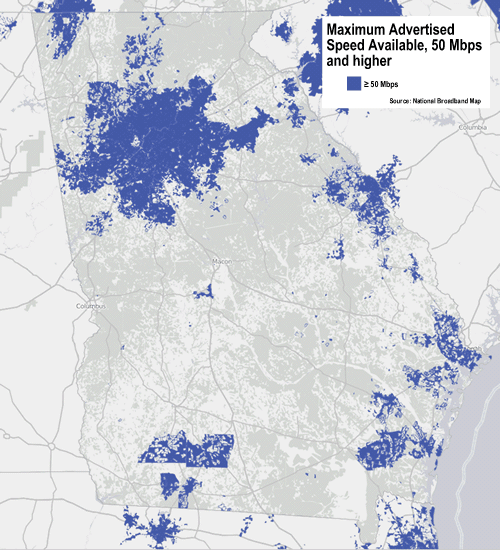
Georgia's broadband map shows just a smattering of 50Mbps broadband. That is half the speed required to attract new businesses, says the IEDC.
Suffering the Great Recession blues? As communities continue to face the loss of manufacturing, heavy industry, and textile jobs to overseas outsourcing, local economic development specialists have discovered one of the most effective ways to lure new high-tech industry into areas hard-hit with job losses is the availability of cheap, plentiful, and fast broadband.
- 42% believe that that 1Gbps is the minimum speed needed to lure new businesses.
- 35% believe the minimum must be at least 100Mbps.
- Rural economic developers appear to be well ahead their urban counterparts in the area of planning. 58% of rural respondents either have broadband strategies and tactics worked into their economic development plans or are writing plans with these elements. Only 39% of urban respondents have done the same.
- 92% see no benefit from the FCC’s minimum broadband standard of 4Mbps, defined largely to suit telephone company DSL service common in rural areas.
Why are rural economies benefiting from better broadband planning? Because in the absence of commercial providers willing to provide the service, an increasing number of small towns and cities are building their own municipal networks to get the job done themselves. Those networks are routinely superior to the facilities provided by most cable and phone companies serving less populated areas.
Community broadband is working in Wilson and Salisbury, N.C., where a transition from a textile/tobacco-based economy into higher-tech knowledge economy jobs required state-of-the-art broadband as a foundation. Chattanooga, Tenn.-based EPB Fiber has already attracted dot.com giants like Amazon.com, creating hundreds of millions in local investment and thousands of new jobs. Why Chattanooga? Gigabit broadband for just a few hundred dollars a month is just one phone call away.
Relying on commercial providers to build 21st century broadband as a platform for economic transformation has delivered uneven results, especially outside of the largest cities. Large cities traditionally get most of the provider’s time, attention, and upgrades. Smaller, more out of the way places often see little or nothing.
That is why this year’s latest push in Georgia and South Carolina to tie the hands of communities trying to remake themselves with modern broadband is so risky. While AT&T and the cable companies may position their argument as “protecting consumers,” in fact they are only protecting their own interests, even if it means the next Amazon.com distribution facility or Google data center finds a better home somewhere else.
Updated 3:55pm ET: We added a link to the full report, with appreciation to the author.


 Subscribe
Subscribe
To get an abstract and full copy of the IEDC-sponsored survey report I wrote, go here – https://roisforyou.wordpress.com/2011/10/04/after-the-stimulus-broadband-and-economic-development/
No. Now you need a bare minimum of one gigabit (upload and download) for 21st century broadband. 100 megabits is aiming far too low to be competitive.